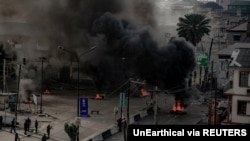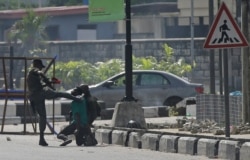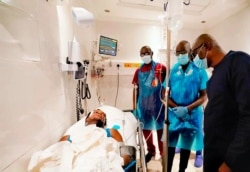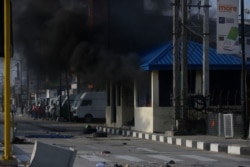Protesters in Lagos, Nigeria, have accused the military of opening fire on them Tuesday as they defied a curfew to demand an end to police brutality. Nigeria's military has denied that the uniformed men, seen in social media videos firing on the unarmed protesters, were their troops.
Twenty-five year old Dominic Alonge left work early after Lagos authorities announced an impromptu curfew that began at 4 p.m. local time on Tuesday.
He spent hours in traffic but couldn't make it through road blocks mounted by protesters. He then walked until he arrived the Lekki toll gate and decided to join the protests.
Alonge says that around 7 p.m., security men in military uniforms descended on the crowd and opened fire after disabling CCTV cameras and street lights, he said.
"They fired rounds and rounds of live ammunitions on dispersing protesters. The security agents could use water or even whips, to disperse people but they used live ammunitions that killed plenty," said Alonge.
Other eyewitnesses say many protesters were killed during the shooting and many more gravely injured.
However, Lagos officials say only one person has died, with others receiving treatment at hospitals in Lagosu state.
State governor Babajide Sanwo-olu visited injured protesters on Wednesday morning and urged Lagos citizens to remain calm.
But human rights organizations are blaming the government for the shooting. Ariyo Dare is the leader of one such group, the Nigeria Center for Liberty.
"The shooting of peaceful protesters by men of the Nigerian army, including other security agencies, are all barbaric acts carried out by rogue soldiers, elements sent by the Nigerian government with the connivance of the Lagos state government to unleash terror on peaceful protesters," said Dare.
Both Lagos authorities and the Nigerian army have denied ordering the shooting.
On Wednesday, hours after the shooting, angry youths launched reprisal attacks all over the state, burning and damaging many state-owned establishments, including media houses believed to be influenced by the government.
The home of the governor's mother was also targeted and razed to the ground.
Ariyo Dare said violence is likely to escalate.
"This protest cannot end with the way and manner the government has handled this protest. There is no way the protests will end in this format, even when the curfew is over Nigerians will still continue these protests," said Dare.
Rights activists have accused Nigerian authorities in the past of using excessive force against citizens.
Amnesty International has been investigating alleged rights violations by Nigerian forces for many years but the organization’s country director, Osai Ojigho, said the perpetrators remain emboldened.
"Our first report focusing specifically on the Special Anti-Robbery Squad (SARS) was done in 2016 and in that report, we gave specific recommendations that needed to happen. One of which was prosecuting violating officers, the second was entrenching the Police Service Commission in order for them to do their job, but sadly things continued. We continued to receive cases and we opened up even further research into this area,” said Ojigho.
As tensions mount across Nigeria, the U.S. consulate in Lagos was shut down Tuesday, and the State Department warned Americans in Nigeria to be careful.







